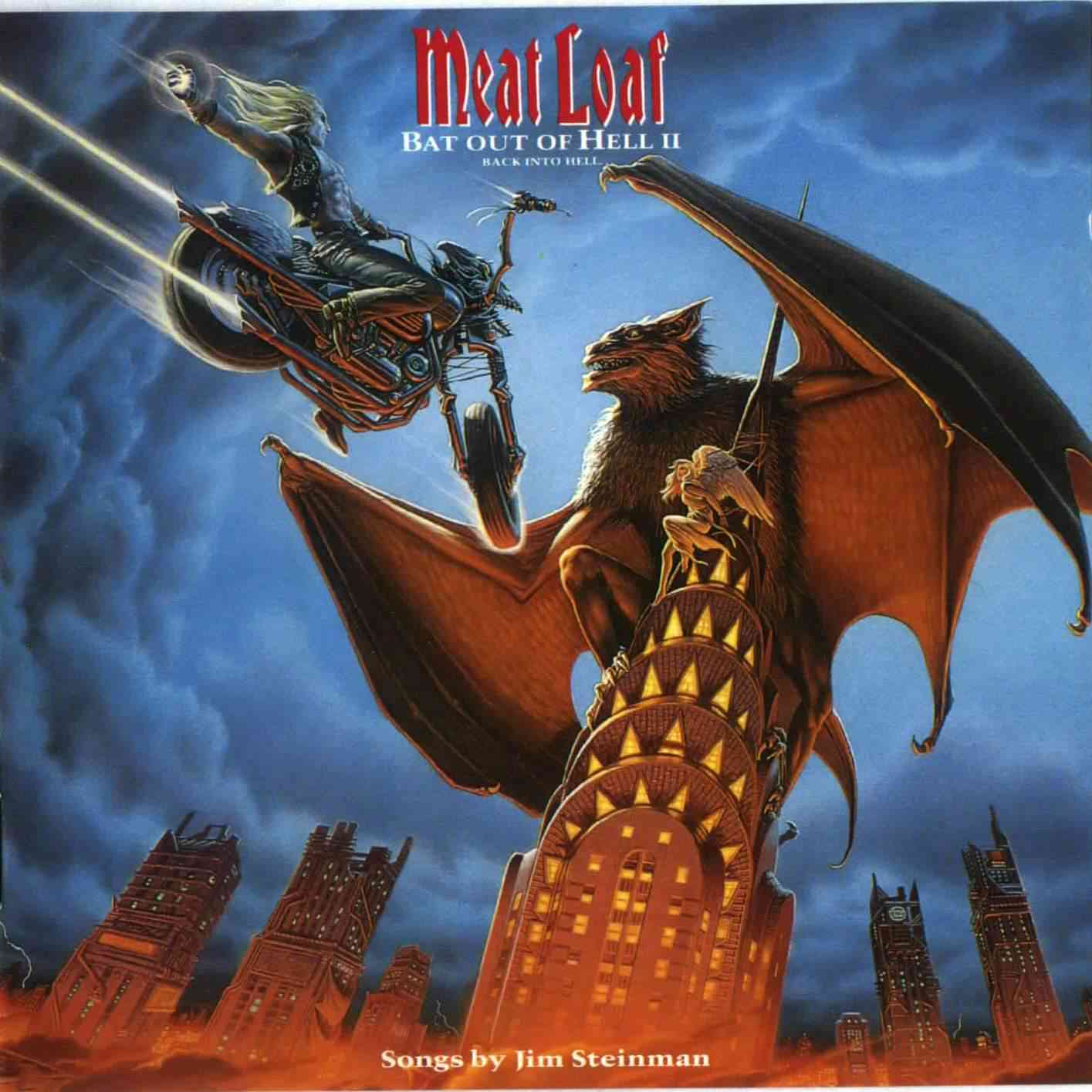
Looking Back: Twenty Years Of "Bat Out Of Hell II"
Twenty years is an eternity. Looking back that far, the world is a completely different place than where we left it, evolution taking us in directions we couldn't have imagined. Cosmically, it is an insignificant amount of time, but for us it is a gaping chasm between who we were and who we are. That amount of time is enough for us to have rewired ourselves, to have become people so different from who we once were as to be rendered unrecognizable, even to ourselves.
Time is the ultimate measure of art, whether it can last and endure as more and more pieces of kindling are thrown on the fire, to the point where the flame is choked off and dies. Music is never-ending, the stream of releases coming so fast that we are content merely to splash in a trickle of the possibilities. It would be easy, each year, to wipe the slate clean and start anew with only fresh albums in our minds. There are more than enough of them to fill every waking hour of the day without needing to look back to the past.
We don't do this, however, because there is a unique quality to great music that allows it to become intertwined with our memories, transporting us back to the days we have left behind. The endurance of a particular piece of music over the course of time is one of the defining experiences we can have as fans, a lasting illustration of how our tastes can change, and how we can sometimes be eerily prescient at a young age.
Twenty years ago, I fell in love with music. There was always music around, but it wasn't until I heard Meat Loaf's "Bat Out Of Hell II: Back Into Hell" that I truly fell under the spell of what great music can do to a person. I was young and naive, possessing no knowledge of what made music work other than an appreciation for pop songs that were fun to sing along to. Meat Loaf's particular brand of music was not a natural fit for me, nor can I explain what it was about his music that moved me.
I was not alone, at the time, as "I'd Do Anything For Love (But I Won't Do That)" was a massive hit, conquering the airwaves. The difference between me and everyone else was that I delved deeper than the song, wanting to know more about the man and the music. I can still remember ripping the plastic coating off the cassette, sliding the tape into my stereo while I unfolded the insert. I had never seen nor heard anything like it, a ludicrous piece of art that couldn't possibly have been serious, or so I thought. No one could have been that over the top without having their tongue firmly planted in their cheek.
I connected with the music on a visceral level, my young brain only seeing what was on the surface. What appealed to me most, at that time, were the juvenile aspects of the music; the dirty guitars in "Life Is A Lemon And I Want My Money Back", the furious shout Meat Loaf delivers that the future is "a crock, and you can shove it up your ass," and Jim Steinman's spoken word piece that mixed sex, comedy, and drama.
For what seemed like ages, I spent as much of my free time as possible sitting in front of the speakers, pouring over the words and notes that came forth. I was in disbelief that music could be something more than a pleasant distraction in the background, but there I was, transfixed by what I was hearing. Not that having a larger collection of music would have mattered, I wore the tape out as I listened to it again and again, to the point where I no longer had to play the album to enjoy it. I could replay every note in my head, enjoying the music whenever and wherever I wanted.
It was my favorite album ever, a title it would hold for most of the twenty years that have followed. What is remarkable about the album is not that it has endured as a favorite, but that it has undergone a transformation, spreading its wings and growing into an entirely different beast than the one I first encountered.
As time has gone on, and I have become more knowledgeable about music, the way in which I see "Bat Out Of Hell II" has changed. I left behind the impulses that loved the basest moments of the record, growing into someone who more appreciates the beauty of the craft. That shift became clear as I pursued my own musical interests, and began to experience music from the creative end. Playing music, and learning how to write songs, turned my perceptions of good music completely around. Songwriting was now the most important thing I could imagine, the skill to turn a raw idea into a polished gem of a song. In many ways, this realization has ruined my enjoyment of music.
As I changed, so too did my focus. The name at the bottom of the front cover, Jim Steinman, became more important than Meat Loaf's name at the top. As much as Meat Loaf's voice was a titanic presence, Jim Steinman was the genius who made the experiment work. Like a mad scientist piecing together a doomsday machine, he is the only songwriter who has ever been able to blend theatrical excess, Wagnerian power, and stunning melody, in a way that was palatable to the masses.
The tortured birth of the album is perhaps most responsible for its excellence. Steinman, genius that he is, was never a prolific writer. After amassing songs for his entire life prior to the first "Bat Out Of Hell", his efforts afterward were spotty at best. By the time he and Meat Loaf were ready to make the second "Bat" album, Steinman had come to understand his limitations, if the irony of that statement can be appreciated.
"Bat Out Of Hell II" plays like a greatest hits album, because that's essentially what it is. More than that, however, it is the defining statement of Steinman's career, the first and only time he was given all the tools necessary to bring his vision to life. It took years for me to be able to see his compositions for what they are, dense collages of sounds that have more going on than can be appreciated on first glance. It's easy to get distracted by Meat Loaf's towering vocal, but Steinman's songs are epic, even when they conform to radio standards. The pianos that drive the album are not beautiful in the familiar fragile way, but instead are percussive bursts of energy that pound along like a second set of drums. Likewise, his melodies are circuitous, wandering strings of notes that rise and fall at just the right times, wholly original and instantly recognizable.
So much of the material on "Bat Out Of Hell II" shouldn't work, but Steinman is able to do the impossible with his songs. Whether a twelve minute single without a true chorus, or the use of bagpipes, or five seconds of slap bass that appears nowhere else, every song has details contained in the backing tracks that defy logic.
As a songwriter, Steinman's achievement is monumental. He was able to straddle the line between being artistic and commercial in a way that no one else has ever mastered. Through his unique vision, he was able to write songs that fed his artistic ambitions, giving no concern to what conventional wisdom would say needs to be done to achieve success, and yet his songs were so singularly reflective of his personality that they resonated with people beyond expectations.
Of course, no discussion of "Bat Out Of Hell II" can be had without discussing the titular 'that' in "I'd Do Anything For Love (But I Won't Do That)". Ever since the song hit the airwaves, speculation has centered around what 'that' is, to the point where the song has become a running joke that no one knows the answer to. I am not so confused by the song. In my mind, the answer is exceedingly simple, which makes the fact that Steinman was able to so mask it either a lucky accident, or his greatest stroke of genius.
What Meat Loaf is singing about in the song, in my mind, is not just his commitment to love, but his commitment to a certain love. In listing the things he would do for love, he is doing so with the assertion that he would do anything for the love of the woman who responds in the duet. Essentially, what he is saying is that the only thing he would not do to find love is accept that he may have to seek the love of someone else.
These are concepts I could not have conceived of when I first encountered the album. My initial love of the record came from the easily seen and digested components, while the enduring power of the record is due to the nuance and depth the songs contain. They show the touch of a songwriter, one who was not writing with one eye on the charts. Jim Steinman was satisfying his inner muse, and he never did it better than on "Bat Out Of Hell II". It is his magnum opus, no matter how many copies the original sold, because it is the purest distillation of what his music is. The album is relentless, a single-minded attempt to write the ultimate record. I don't know if it succeeds on that level, but it is a stunning example of the power of music, and twenty years later, it has lost none of its potency.

